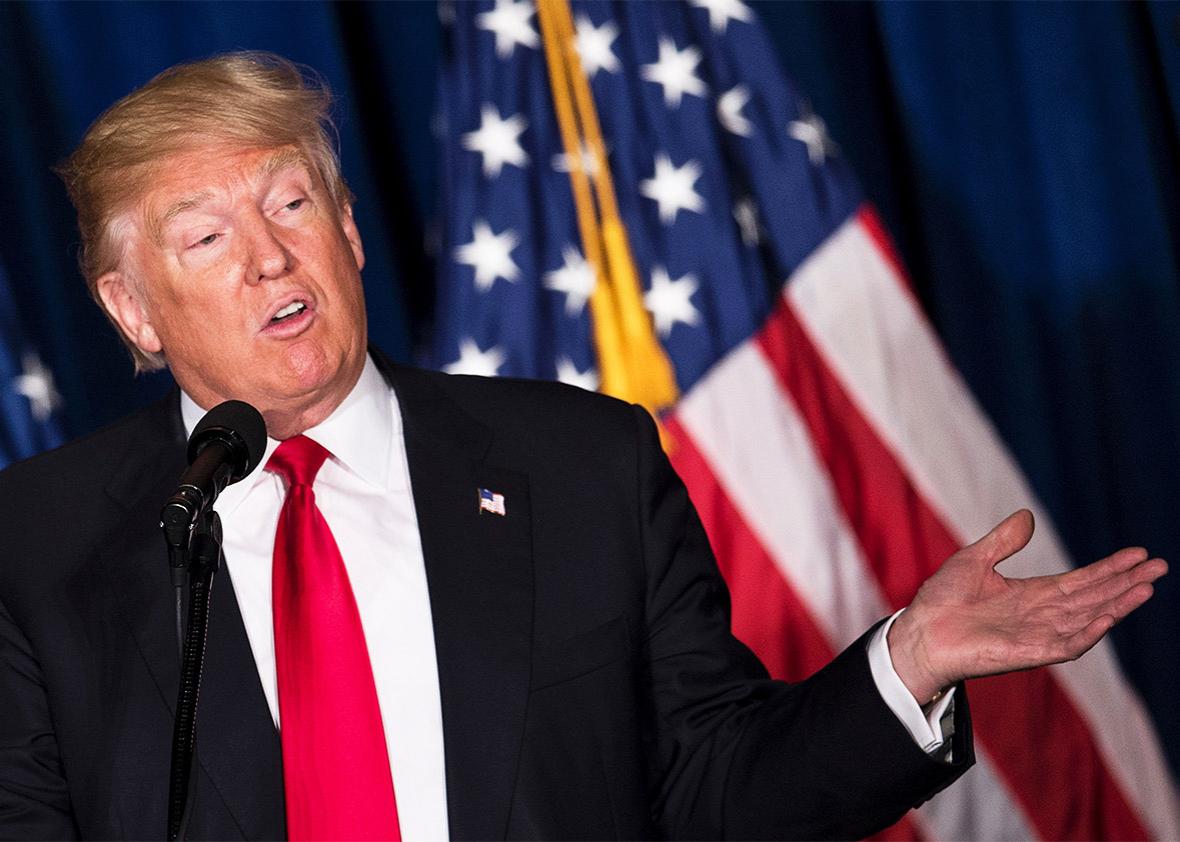“The whole world will be safer if our allies do their part to support our common defense and security,” Donald Trump said Wednesday in Washington, D.C., roughly a quarter of the way into what his campaign had billed as a “major foreign policy address.” He continued, “A Trump administration will lead a free world that is properly armed and funded.”
That’s where the line was supposed to end according to Trump’s prepared remarks. But he couldn’t help himself. “And funded beautifully,” he added.
This speech was almost assuredly one of those things that the new, “grown-up” Trump is doing at the behest of his freshly hired advisers, led by Republican lobbyist and operative Paul Manafort. The goal is not necessarily for Trump to become more “presidential” so much as it is to trick idiots in the media into swallowing the narrative that he is becoming more presidential.
One of the most tiresome and successful rituals for tricking media suckers into believing a presidential candidate is legit is the spectacle of the Major Foreign Policy Address in which a candidate Lays Out His Foreign Policy Vision. This speech, usually delivered near the beginning of a presidential campaign but, in Trump’s case, delivered after he’s convinced primary voters to select him without demonstrating any knowledge whatsoever, does not have to be coherent. All it needs to do is toss a little Pentagon lingo and a few out-of-context numbers into a broth of wild threats and unearned projections of strength.
The setting for such an address is critical, too, and Trump’s team went with what you might call the Full Washington: a ballroom at the ornate Mayflower Hotel downtown stocked with white-haired old men in suits who’ve spent their careers musing pensively about whom to bomb next. It made for an interesting moment when, near the end of his speech, Trump went on a riff against the established foreign policy expert community for its “continued losses at war.” “We have to look to new people,” he said, off script now, “because many of the old people, frankly, don’t know what they’re doing, even though they may look awfully good writing in the New York Times or being watched on television.”
The address also brought out old Washington journalistic hands who might not be used to the Trump campaign’s strong-arming of reporters at events. Shortly before the speech began, for example, Washington Post legend Bob Woodward was instructed to move inside the designated press pen.
Everything about the setting was perfect, down to the smell of cigarette smoke (even though no one was smoking). Smoke in a D.C. room connotes seriousness; perhaps it was pumped in artificially.
This was Manafort making his candidate eat his broccoli. Trump read his prepared remarks briskly and woodenly, cheering up only during his ad-libbed flourishes. He checked off certain statistics about, say, the number of ships the Navy maintains. He said secondly and thirdly at various points in the speech, as a serious policy speaker does, even if it was unclear whether there had been a first plank or if he had even introduced a numbered list. He delivered the standard lines about how neither President Obama nor Hillary Clinton will say radical Islam, how our allies no longer trust us to have their backs, how he will do whatever it takes to destroy ISIS. He bravely refused, however, to tell ISIS specifically how he intends to eliminate the terrorist group, because he believes it’s imperative to be “unpredictable” in foreign policy. (“We tell everything!” he ranted, off-script. “We’re sending troops, we tell them. We’re sending something else, we have a news conference.”)
Mostly clean sentences, a few statistics, vague threats, and an oversimplification of how easy it is to conduct foreign policy: That’s most of what’s important in Laying Out a Foreign Policy Worldview.
Perhaps most important, though, is a lack of substance beyond the superficialities listed above. Here, Trump succeeded, too. To put it simply: Trump tried to blend his own twists on foreign policy—making allied nations pay up for American protection, for example—with typical orthodox Republican foreign policy thinking. This led to a speech rife with fundamental, glaring contradictions. He lacerated the Clinton administration for working to bring China into the World Trade Organization only to declare later that “a strong and smart America is an America that will find a better friend in China.” Every section about how the United States needs to reassure our allies that we have their backs at all costs was followed by a section about how our cheap allies need to “pay their fair share” for mutual defense or be cut off.
Another way of describing Trump’s foreign policy worldview: He doesn’t have one. He makes it all up minute by minute, and the words his aides made him read on television today were simply words his aides made him read on television. This speech was television; it was spectacle, just like the rest of his presidential campaign, which did not in any way begin a new, more serious phase today. Surely even the suckers in the media weren’t naive enough to take the “wow, this is some serious presidential stuff” bait today, right?
We’re doomed.
